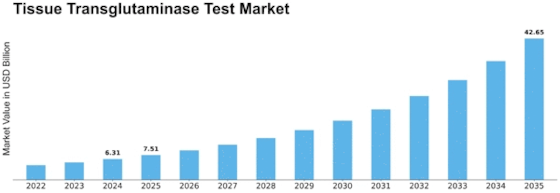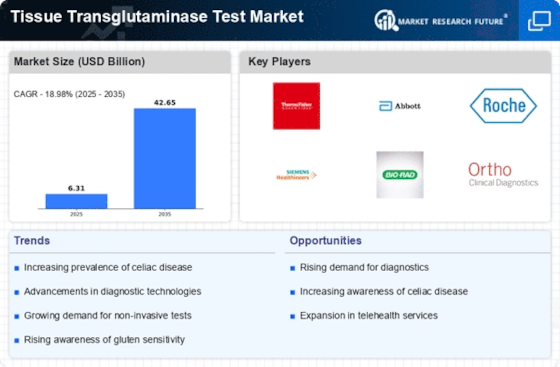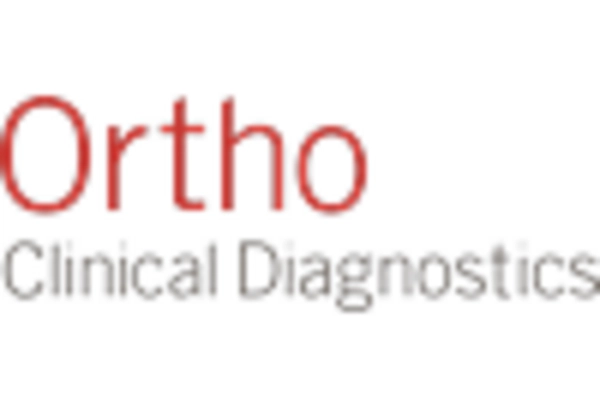Tissue Transglutaminase Test Size
Tissue Transglutaminase Test Market Growth Projections and Opportunities
The Tissue Transglutaminase (TTG) Test Market is significantly driven by the prevalence of celiac disease, an autoimmune disorder triggered by gluten consumption. As the awareness and diagnosis of celiac disease increase globally, the demand for TTG tests, particularly the serological TTG-IgA test, rises for accurate and timely detection of this condition. Celiac disease testing is associated with symptomatic significance in tissue transglutaminase. TTG is an antigen which attacked by the immune system in celiac disease. The test assists in the verification of a diagnosis; it also provides information on severity, and can be used to assess efficacy of gluten-free diet which makes this testing commercially popular. Technological advancements in serologic evaluation technologies determine the tissue transglutaminase test market. Advancements in assay sensitivity and specificity such as the point-of -care tests optimize TTG testing accuracy to meet healthcare providers’ dynamic needs. Increased sensitivity is indicative of increased awareness to celiac disease and gluten-related disorders which also act as a stimulus for the growth of the TTG Test Market. Public health campaigns, education initiatives and the general knowledge have led to their consequential need for TTG testing as early diagnosis of celiac disease eventually leads into its management. The TTG Test Market coincides with the global movement to gluten-free diets, from both a medical point of view and lifestyle. If the patient is opting for gluten-free lifestyles, being either celiac disease or nonceliac gluten sensitivity and requires subsequent confirmation testing of TTG; this test may be performed on serum samples to corroborate a prior diagnosis. The recommendations of clinicians, the compliance with diagnostic guidelines have an impact on TTG Test Market. The physician awareness of the celiac disease guidelines and their incorporation into routine clinical practice, thus promoting TTG testing for accurate diagnosis and sound patient management determines. The genetic predisposition toward celiac disease, mainly linked to HLA-DQ2 and the HLA DQ8 genes leads individuals with a family history into TTG testing. Genetic screening, coupled with serological testing helps identify individuals who may be at risk therefore boosting the market. All the above factors i.e., increasing healthcare awareness, improving diagnostic infrastructure and a growing number of reported celiac disease cases make the TTG testing in emerging markets to meet its demand rise gradually due to poor facilities for clinical analysis additionally lacking money sources. These areas are the markets that increase TTG Test Market Growth in general. The non-invasive nature of serological TTG testing appeals to patients and healthcare providers alike. As patients often prefer less invasive diagnostic methods, the blood-based TTG test offers a convenient and widely accepted approach for celiac disease diagnosis and monitoring. The ongoing impact of the COVID-19 pandemic has led to disruptions in healthcare services, affecting diagnostic testing patterns. However, the awareness of celiac disease and the need for TTG testing persist, and the market is expected to rebound as healthcare services normalize.



















Leave a Comment